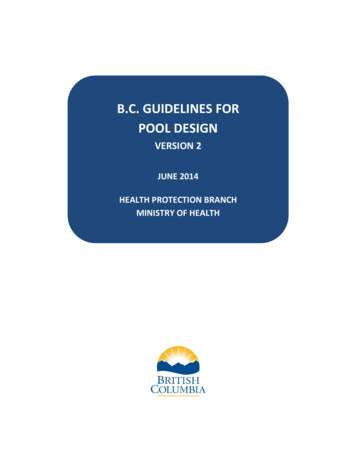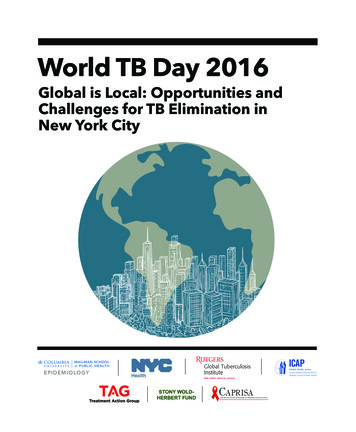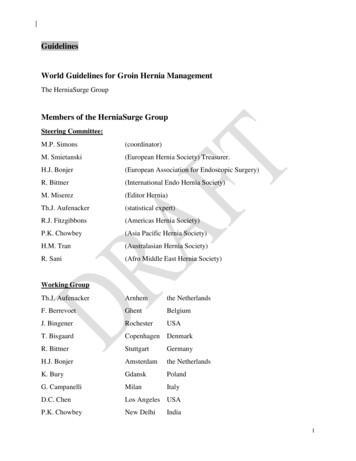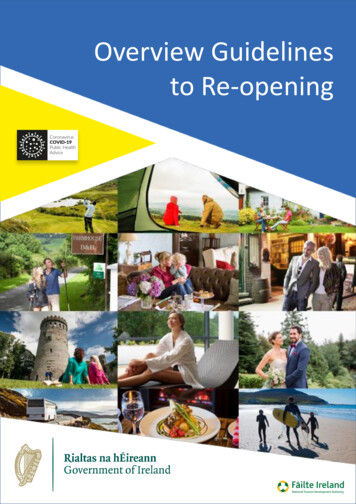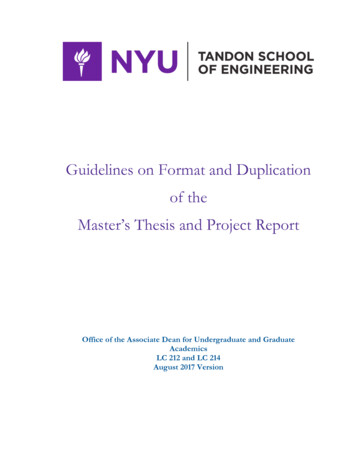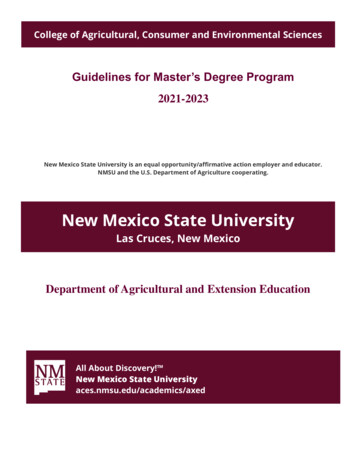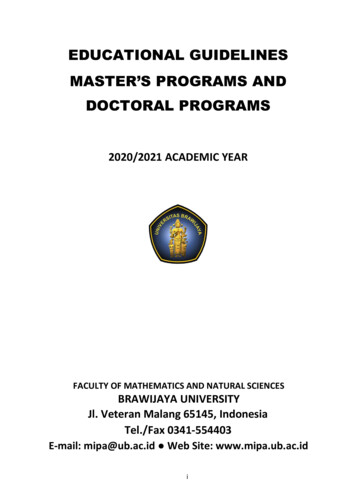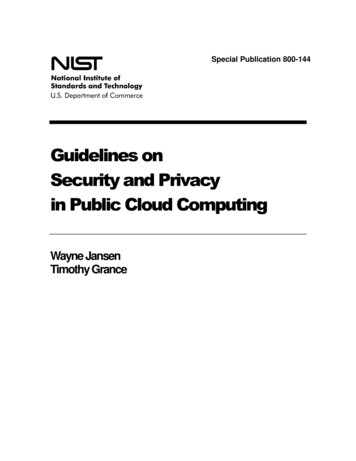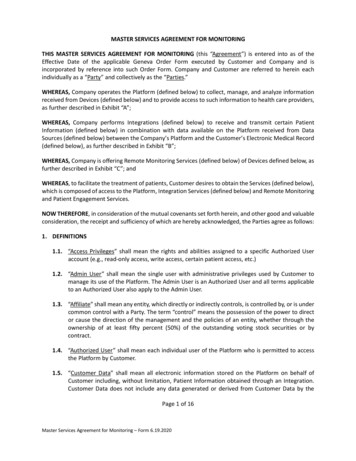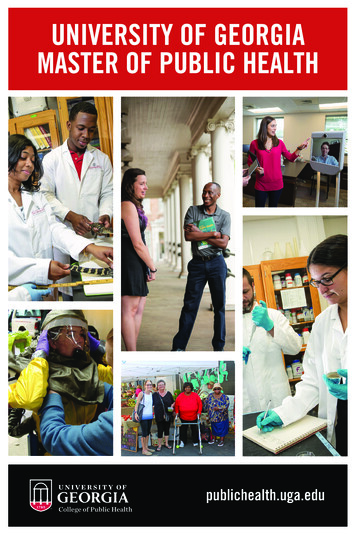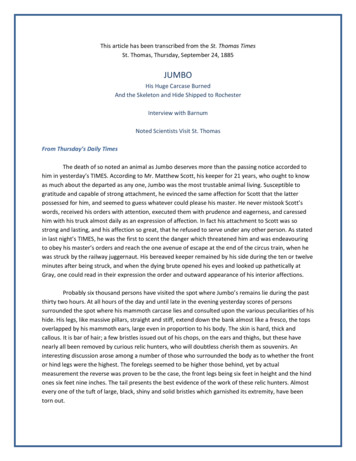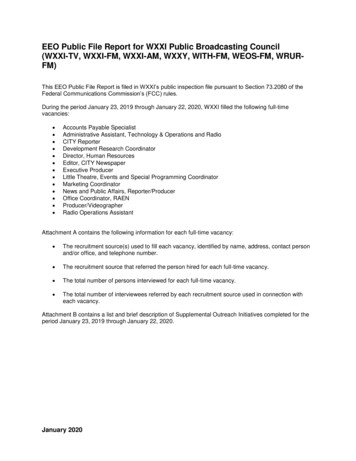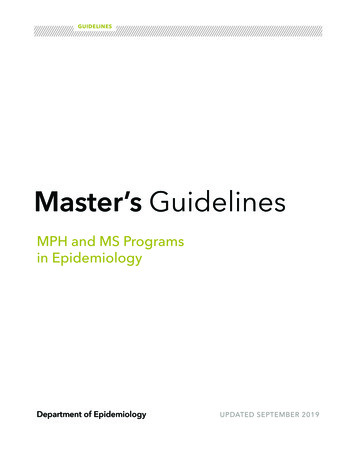
Transcription
GUIDELINESMaster’s GuidelinesMPH and MS Programsin EpidemiologyDepartment of EpidemiologyUPDATED SEPTEMBER 2019
Department Of EpidemiologyMailman School of Public HealthAllan Rosenfield Building (ARB)722 West 168th Street, 7th FloorColumbia University*Chair, Master’s Committee in EpidemiologyDr. Larkin McReynoldsARB 2nd Floor, Room 251Tel: 646-774-5746 Email: lsm34@cumc.columbia.edu*Director, Master’s of Science in Epidemiology, Executive Format ProgramDr. Grace HillyerARB 7th Floor, Room 704Tel: 212.342.1658 Email: gah28@cumc.columbia.edu*Director for Academic ProgramsLiliane ZaretskyARB 7th Floor, Room 728Tel: 212.305.9410 Email: lz3@cumc.columbia.eduDepartment Fax: 212.305.9413Project Manager for Academic ProgramsElizabeth FerrariARB 7th Floor, Room 722Tel: 212.342.4552 Email: ef2109@cumc.columbia.eduVice Chair of EducationDr. Lisa M. BatesARB 16th Floor, Room 1610Tel: 212.305.0842 Email: lb2290@cumc.columbia.eduChair, Department of EpidemiologyDr. Charles BranasARB 15th Floor, Room 1508Tel: 212.305.08755 Email: ccb2166@cumc.columbia.edu*indicates main contact for ’s CommitteeSandra AlbrechtSimon AnthonyThomas BrieseKatherine CrewHenry GreenbergGrace HillyerYael Hirsch-MovermanMady HornigMaria LaHuertaLarkin McReynoldsMax O’DonnellWilliam ReidyParisa Tehranifar
WELCOME, AND A GUIDE TO THESE GUIDELINESDear Master’s students,Welcome to the Department of Epidemiology! We are delighted to welcome the currentcohort of students and are deeply committed to assuring that each one of you has anoptimal educational experience in the Department of Epidemiology.Our Master’s degree offerings are designed to prepare students for careers in a widearray of public health research and service settings. Our students are provided theskills to design, conduct, interpret and apply research into the causes, prevention,and control of human disease towards the ultimate goal of improving the public’shealth. The curriculum emphasizes mastery of methods of epidemiological researchand is enriched by additional courses on a wide range of important injury and diseaseoutcomes, such as AIDS, tuberculosis, and cancer, and on factors that may be importantin disease causation, such as genetics, nutrition, and influence of the social andphysical environment.A quick overview of the information presented in this guide: In Section I we list the five Master’s degree programs in the Department ofEpidemiology, with brief descriptions of each. These descriptions referencespecific components of the overall Master’s program, including coursework,certificate, practicum, and thesis. In Section II we describe components of the Master’s program and includea snapshot of how these program components correspond to each of thefour degree offerings. Section II also provides a listing of the 22 certificateprograms open to Epidemiology students, with links to the correspondingwebpages that describe course requirements for Epidemiology students. In Section III we provide information about the key sources of supportand advice for Master’s students and describes resources and activitiesdesigned to optimize your educational experience in the Department.It is our sincere hope that these guidelines will enable you to have an optimaleducational experience in the Department of Epidemiology. As such, we welcome andencourage any suggestions for their improvement.Our very best wishes,Larkin S. McReynolds, Phd, MPHChair, Master’s Committee in EpidemiologyLisa Bates, ScD, ScMVice Chair of Education, Department of Epidemiology1MA STER’ S G U ID E LIN E S
TABLE OF CONTENTSSection I.Master’s Degree Programs in Epidemiology . . . . . . . . . . . . . 41. Columbia Master of Public Health (MPH). . . . . . . . . . . . . . . . . . . . . . . . . 42. Accelerated MPH . . . . . . . . . . . . . . . . . . . . . . . . . . . . . . . . . . . . . . . . . . . . . . . . . . . . . . 53. Master of Science (MS). . . . . . . . . . . . . . . . . . . . . . . . . . . . . . . . . . . . . . . . . . . . . . . 64. Master of Science (MS), Executive Format. . . . . . . . . . . . . . . . . . . . . . . . 65. Part-time MPH. . . . . . . . . . . . . . . . . . . . . . . . . . . . . . . . . . . . . . . . . . . . . . . . . . . . . . . . . . . 7Section II.Elements of the Master’s degree . . . . . . . . . . . . . . . . . . . . . . . . . . . . . . . 81. Snapshot of degree requirements. . . . . . . . . . . . . . . . . . . . . . . . . . . . . . . . . 82. A note about advising. . . . . . . . . . . . . . . . . . . . . . . . . . . . . . . . . . . . . . . . . . . . . . . . 83. The interdisciplinary core . . . . . . . . . . . . . . . . . . . . . . . . . . . . . . . . . . . . . . . . . . . 94. The methods sequence. . . . . . . . . . . . . . . . . . . . . . . . . . . . . . . . . . . . . . . . . . . . . . 95. Additional course requirements. . . . . . . . . . . . . . . . . . . . . . . . . . . . . . . . . . 106. Certificate programs. . . . . . . . . . . . . . . . . . . . . . . . . . . . . . . . . . . . . . . . . . . . . . . . . 127. Dual degree programs. . . . . . . . . . . . . . . . . . . . . . . . . . . . . . . . . . . . . . . . . . . . . . 138. The practicum. . . . . . . . . . . . . . . . . . . . . . . . . . . . . . . . . . . . . . . . . . . . . . . . . . . . . . . . . 149. Master’s thesis. . . . . . . . . . . . . . . . . . . . . . . . . . . . . . . . . . . . . . . . . . . . . . . . . . . . . . . . 1610. Department seminars, grand rounds, and symposia. . . . . . . . . 18Section III.Resources and special activitiesfor Master’s students. . . . . . . . . . . . . . . . . . . . . . . . . . . . . . . . . . . . . . . . . . . . . . . . . . 191. Questions, concerns, and department resources. . . . . . . . . . . . . . 192. The EPIC fund. . . . . . . . . . . . . . . . . . . . . . . . . . . . . . . . . . . . . . . . . . . . . . . . . . . . . . . . . . 22Appendices2Appendix 1: Students as Researchers Policy. . . . . . . . . . . . . . . . . . . . . . . . . . . . . . . . . . . . 24MA STER’ S G U ID E LIN E S
Section IMaster’s degree offerings in theDepartment of EpidemiologyThe Department of Epidemiology offers fiveMaster’s degree programs. In addition, there area number of dual degree offerings which will bedescribed on page 13.1 Columbia Master of Public Health (MPH)2 Accelerated MPH3 Master of Science (MS)4 Master of Science (MS) inEpidemiology, Executive Format5 Part-time MPH3MA STER’ S G U ID E LIN E S
SECTION I1MASTER’S DEGREE OFFERINGS IN THE DEPARTMENT OF EPIDEMIOLOGYThe Columbia MPH Programin EpidemiologyCompleted in: 2 yearsIncludes: Certificate in one of 22 school-wide programsThe Columbia MPH program offers an integrated interdisciplinary schoolwide curriculum in which students select one of 22 Certificates that provides asecondary area of expertise in addition to students’ departmental focus, in this case,Epidemiology. Students take the interdisciplinary core courses in the fall semester oftheir first year, and the bulk of the methods sequence (Epidemiology and Biostatistics)courses in the spring semester. With the exception of students undertaking the GlobalHealth Certificate, most students will undertake a practicum during the summerbetween years one and two. Most of the certificate courses are taken in the secondyear, during which time the students will also write a Master’s thesis that bringstogether skills and approaches from the Epidemiology methods and content from SCIPLINECERTIFICATELEADERSHIP &INNOVATIONINTEGRATION OFSCIENCE AND PRACTICESEMESTER 1FALL4CERTIFICATEINTEGRATION OFSCIENCE AND PRACTICESEMESTER 2SPRINGSUMMERSEMESTER 3FALLSEMESTER 4SPRINGMA STER’ S G U ID E LIN E S
SECTION I2MASTER’S DEGREE OFFERINGS IN THE DEPARTMENT OF EPIDEMIOLOGYThe Accelerated MPH in EpidemiologyCompleted in: 1 yearThe Accelerated MPH is designed for highly motivated professionals seeking toenhance their careers with a degree in public health. The curriculum is similar tothe two year MPH but completed at a faster, more demanding pace and without acertificate. The curriculum provides the broad, systemic understanding, critical thinkingskills, and leadership training needed to tackle today’s complex public health problemsand work effectively with a variety of professional settings.Candidates for the Accelerated MPH will have one of these qualifications: A doctoral degree (such as an MD, DDS, PhD, JD, DNSc, EdD, etc.) A nearly completed doctoral degree (within 24 months of completion) A Master’s degree (such as an MS, MA, MBA, MSN) and at least 5 yearsrelated work experienceStudents take the integrated core courses and one substantive epidemiology coursein the fall semester. In the spring semester students complete the ISP, take Leadershipand Innovation, the methods sequence (with the exception of Epi III), and two additionalsubstantive epidemiology courses. Epidemiology III will be completed in the firstsummer session. Students will undertake a practicum of at least 140 hours which canbe completed as their schedule allows—either part time or full time during spring orsummer following their fall matriculation in order to complete all degree requirementsin one year. Accelerated students write an abstract and prepare a poster which will bedisplayed at Epi Master’s Student Day in October. The accelerated student is invitedto be in attendance, but this is not a requirement. Given the time constraints of thedegree, a Master’s thesis is not required. The degree is conferred in IP &INNOVATIONPRACTICUMCOREINTEGRATION OFSCIENCE AND PRACTICESEMESTER 1FALL5INTEGRATION OFSCIENCE AND PRACTICESEMESTER 2SPRINGMAY– JULYMA STER’ S G U ID E LIN E S
SECTION I3MASTER’S DEGREE OFFERINGS IN THE DEPARTMENT OF EPIDEMIOLOGYThe Master of Science (MS) inEpidemiologyCompleted in: 2 yearsThe Master of Science (MS) in Epidemiology is a research degree, usually undertaken byindividuals who hold another graduate or professional degree in a related discipline suchas MD, DDS, DO, MSN, or PhD. Occasionally an individual without an advanced degreeundertakes the MS if they have two or more years of relevant experience, preferably inhealth research. The program is designed to provide trainees with a command of majorconcepts and techniques in epidemiology as well as a solid foundation in biostatistics.Students learn the skills necessary to develop testable hypotheses and design researchprojects, from clinical trials to broad population studies. Graduates of the program oftengo on to become independent researchers.While the competencies achieved through the MS program are the same as thosefor students enrolled in the MPH program, MS students concentrate on researchmethodology specific to the discipline of epidemiology, are exempted from thepracticum and have fewer required courses to take. MS students will complete a Master’sthesis.4The Master of Science (MS) inEpidemiology, Executive FormatCompleted in: 20 months (one three-day weekend per month)The Executive MS in Epidemiology (cuexecmsepi.org) is designed to provide workingprofessionals with the additional knowledge, skills, and credentials needed to advancein their current position or turn their career in a new direction. Executive MS studentsare highly motivated professionals who work in health departments, academic settings,pharmaceutical companies, hospitals, and other healthcare settings in the US and abroad.With a weekend class schedule, the program is tailored to accommodate the professionaland family obligations of our students. Classes are held one 3-day weekend (FridaySunday) per month for 20 months. Three semesters in Year 1 (Fall, Spring, and Summer)and two in Year 2 (Fall and Spring) provide Executive MS trainees with a commandof major concepts and techniques in epidemiology as well as a solid foundation inbiostatistics. Students will learn the skills necessary to develop testable hypotheses anddesign research projects, from clinical trials to broad population studies. Faculty advisorsare available by appointment for in-person meetings or via phone or email.No practicum is required as part of the Executive MS program but students will completea Master’s thesis. Compressed into a one semester thesis class (P9421) offered one fullday per month in the Year 2 Spring semester, the Executive MS thesis class is composedof a combination of lecture and workshops with individualized help that is augmentedby weekly virtual office hours. Short periodic meetings during the fall semester assistExecutive MS students in locating a thesis reader, a data set, and with obtaining ColumbiaUniversity human subjects (IRB) approval as needed. The final thesis product is formattedas a publishable paper suitable for journal submission in their respective field.6MA STER’ S G U ID E LIN E S
SECTION I5MASTER’S DEGREE OFFERINGS IN THE DEPARTMENT OF EPIDEMIOLOGYPart-time MPH in EpidemiologyA small number of MPH students choose to undertake the program part time. Below isa semester breakdown of the Core requirements required in the part-time program, aswell as Integration of Science and Practice and Leadership courses that make up theMPH shared curriculum. Additionally, here is some information regarding the timing ofthese requirements:Daily/Weekly Schedule for Part-time StudentsFirst semester part-time students at Mailman are scheduled for class beginning at 2:30PM and ending at 7 PM most days of the week (Cohort 4). During the first three weeksof the semester, part-time students are scheduled for classes during this full block.However, there will be several periods during the semester when students may haveonly one or two courses and will be coming to campus a small portion of that time,beginning at 4 PM. There is variability in the Friday schedule as well. Fridays are thedays when small group recitations are sch
Columbia Master of Public Health (MPH). 4 2. Accelerated MPH . A Master’s degree (such as an MS, MA, MBA, MSN) and at least 5 years related work experience Students take the integrated core courses and one substantive epidemiology course in the fall semester. In the spring semester students complete the ISP, take Leadership and Innovation, the methods sequence (with the exception .
